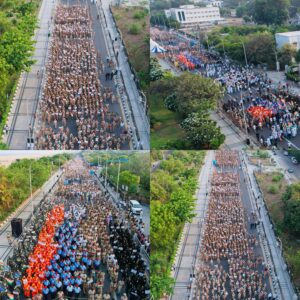The march began on 10 May from the DGP’s office along Chennai’s Marina Beach Road and concluded at the War Memorial. Thousands, including ministers, ex-servicemen, students, and civil servants, joined the procession, with banners declaring the state’s support.
Published May 10, 2025 | 8:42 PM ⚊ Updated May 10, 2025 | 8:42 PM

Tamil Nadu’s legacy of unity and solidarity with the country at times of crisis stretches back decades, despite the state’s otherwise self-assuring politics.
Synopsis: In a show of unity, Tamil Nadu Chief Minister MK Stalin led a solidarity march on 10 May in Chennai, backing the Indian Army’s military operations. Thousands, including ministers, ex-servicemen, students, and civil servants, joined the procession from the DGP’s office to the War Memorial, with banners declaring the state’s support.
At the height of escalating tensions between India and Pakistan, on 7 May, Tamil Nadu Chief Minister M K Stalin issued a statement on his X account to express his government’s support for the then ongoing military operations.
“Tamil Nadu stands with the Indian Army against terrorism. With our Army, for our nation. Tamil Nadu stands resolute.”
What followed surprised many – an announcement on 9 May that he would lead a march in support of the Indian Army.
This came despite the state’s full-blown conflict with the Union government over the past few months on a variety of issues, from the National Education Policy and delimitation to fiscal equality and more.
“Pakistan continues to nurture terrorism and is brazenly carrying out intrusions in India. This is the time to show our support for the brave Indian soldiers who are fighting to protect us,” he wrote.
“Tomorrow at 5 pm, a march will be held from the DGP’s [Director General of Police] office to the War Memorial on Marina Beach. I will lead this march, which will also include ex-servicemen, ministers, members of the public, and students.”
Despite more than six decades of differences between Tamil Nadu and the Union government on various issues, the state has consistently stood for national unity whenever India has faced an external threat.
Following this legacy, Chief Minister Stalin led the public on Saturday’s march.
The march began on 10 May from the DGP’s office along Chennai’s Marina Beach Road and concluded at the War Memorial.
Following the announcement of a ceasefire, Stalin wrote:
“The ceasefire is a welcome step – may peace endure. Our heartfelt salute to the courage of those who guard our borders. ”
Senior ministers of the Tamil Nadu government, DGP Shankar Jiwal, and Chief Secretary N Muruganandam, former armed forces personnel, police officers, members of other security forces, civil servants, and alliance party leaders like Vaiko [Marumalarchi Dravida Munnetra Kazhagam], Thol Thirumavalavan [Viduthalai Chiruthaigal Katchi], and K Selva Perunthagai [Tamil Nadu Congress Committee – TNCC], Deputy Chief Minister Udhayanidhi Stalin took part alongside thousands carrying the national flag.
Banners bearing the slogan “Tamil Nadu against terrorism. We stand with Indian armed Forces” were displayed prominently.
A tribute was also paid to the martyrs of the Indian Army at the memorial.
Tamil Nadu’s legacy of unity and solidarity with the country at times of crisis stretches back decades, despite the state’s otherwise self-assuring politics.
During the 1962 Indo-China war, when the Union Home Minister Lal Bahadur Shastri moved a resolution to grant sweeping powers to the Indian government, C N Annadurai, representing Tamil Nadu in the debate, remarked:
“In this war which is crucial for protecting the country’s future, honour, and safety, I proudly inscribe the name of the Dravida Munnetra Kazhagam (DMK) in the roll of honour.”

Senior ministers, former armed forces personnel, police officers, alliance party leaders among others took part alongside thousands carrying the national flag.
This was a time when Tamil Nadu was engaged in intense opposition to Hindi imposition and was advocating for greater state autonomy. Yet, DMK leaders and actors campaigned in support of the Indian government, setting aside ideological differences.
In the 1971 India-Pakistan war that led to the creation of Bangladesh, then Chief Minister M Karunanidhi passed a resolution in the Tamil Nadu Assembly condemning Pakistan’s aggression and raising the slogan of national unity.
He also handed over ₹6 crore in war relief funds collected from the people of Tamil Nadu to Prime Minister Indira Gandhi.
Similarly, during the 1999 Kargil War, Karunanidhi raised ₹50 crore in relief funds, which he handed over to then Prime Minister Atal Bihari Vajpayee.
While Tamil Nadu and the DMK have long upheld the principles of federalism and state autonomy, their efforts to support national unity during wartime are nothing new.
(Edited by Dese Gowda)
